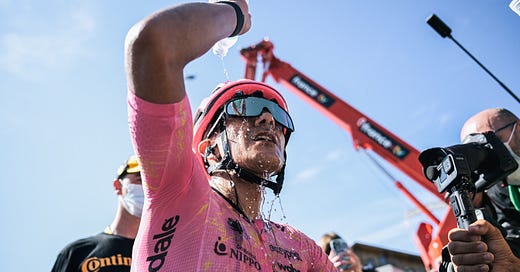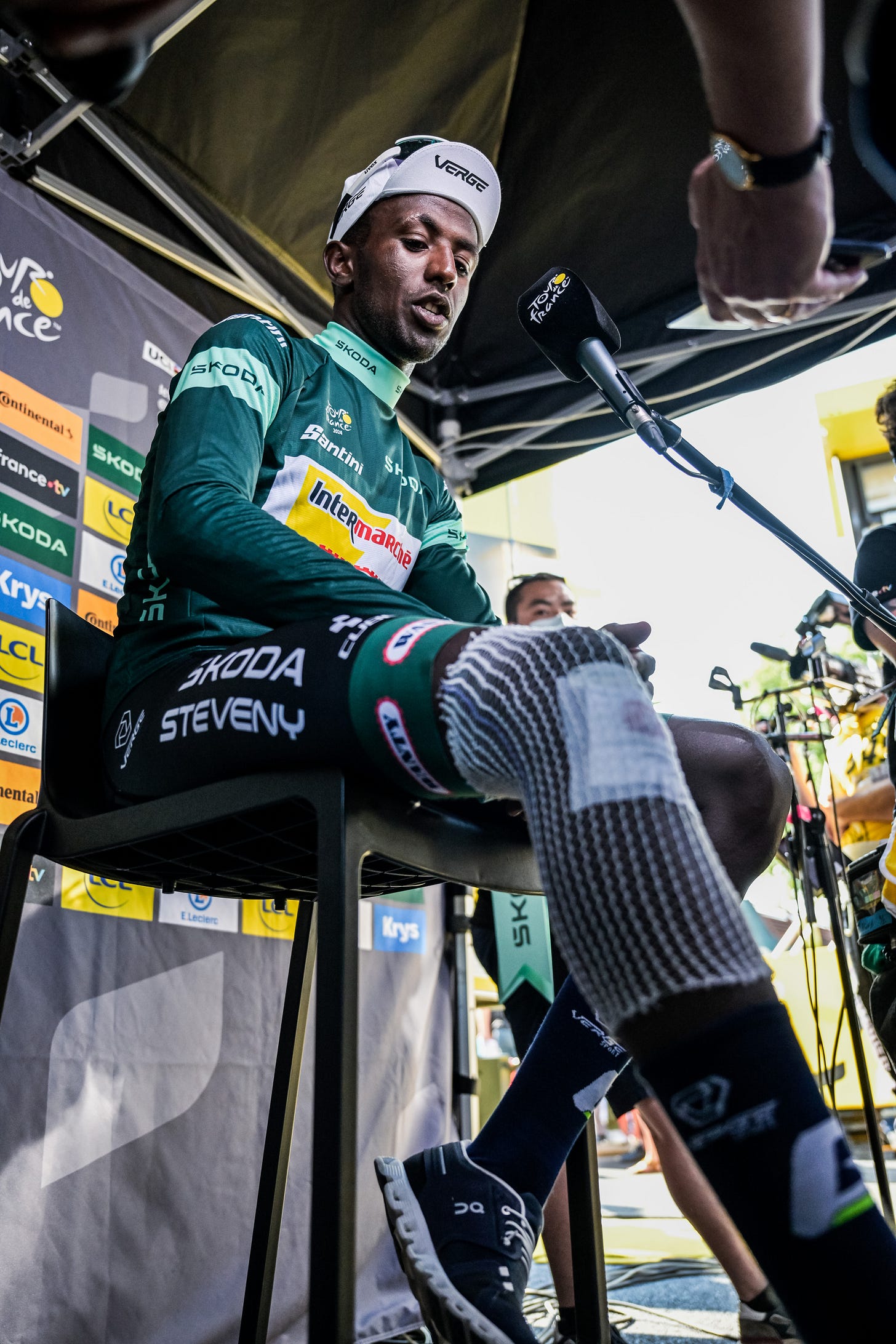A little heads-up about the newsletter schedule for the next week: If you’re wondering why Friday morning’s edition is coming out on Wednesday afternoon, it’s because I’m going to be traveling for a wedding1 this weekend and have no idea when I’ll be able to write. That also means that the first newsletter of next week, which will be a final wrap-up of the Tour de France, might be delayed until Wednesday. I hope not, but I don’t want to make promises I can’t keep and end up having to respond to…probably zero, if I’m honest…angry emails from readers demanding their normal Tuesday Wheelysports.
After that, regularly scheduled programming will resume with an Olympic time trial preview next Friday morning, and then the Tour de France Femmes and the Vuelta, and the transfer market, and the Laurentian Classics, and worlds, and Il Lombardia, and then the end of the season.
I’ll start with three thoughts about Stage 17 and end with a preview of the final weekend’s GC implications.
Thought No. 1: It looks like Biniam Girmay is going to avoid disaster, but only just.
After two weeks, I was pretty sure our beloved Bini would make it to Nice in green not because it wasn’t possible for Jasper Philipsen to get to 300-odd points. Rather, I thought it was going to be exceedingly difficult for him to get to 300-odd points without Girmay scoring enough to maintain his lead. Even a win on a sprint stage—worth 50 points—would only net Philipsen 20 points if Girmay finished second. Less if Girmay, as expected, held serve in the intermediate sprints.
Well, on Stage 16, Philipsen netted four points in the intermediate sprint, then won the bunch sprint to take the stage. And Girmay, to near-universal horror, was nowhere to be found, having crashed heavily in the final kilometers of the stage.
He rolled in well after the final bell, jersey torn and two teammates propping him up. Fifty points for Philipsen, zero for Girmay. And all of a sudden the Eritrean star’s lead in the points classification was down to 32, from a peak of 107. That’s squeaky bum time, even with no dedicated sprint stages left.
Girmay got patched up and went back out this morning, and when the intermediate sprint came up he was glued to Philipsen’s rear wheel. Alpecin-Deceuninck paced and paced and gave Philipsen a perfect leadout, and Girmay still swung around out of his slipstream and took fifth place in the sprint (after the four-man breakaway) to net a single point against Philipsen.
Right now, the lead is back up to 33 points with (as I see it) three sprints—two intermediates and the Stage 18 finish—that Girmay and Philipsen have even a prayer of scoring on. Finishing first at all three would be worth 70 points in total, while finishing second in all three would be worth 59, so Philipsen doesn’t control his destiny anymore. I think Girmay is going to be OK, but he has to stay upright.
Thought No. 2: Hooray for Richard Carapaz
The frequently beleaguered Ecuadorean, who spent one day in yellow earlier this race,2 finally got his stage win. For the past week, EF has been putting Carapaz and Ben Healy in breakaways and countermoves on mountain stages, only to watch Tadej Pogačar wipe all their work away with one titanic attack after another.
Stage 17 was extremely weird: 178 kilometers, of which the first 140 or so were a gentle, steady uphill slope, followed by three short climbs in the final 30 to 35 kilometers. A four-man break got about a minute ahead of the field, but the peloton wouldn’t let it go, and so the stage was raced at a ridiculous pace, coming in at the very fast end of the predicted timetable.
The fastest mass start stage in Tour history averaged a little over 50 kilometers per hour in 1999, at the height of the thick blood era. This was technically a mountain stage, and it came in at 43.328 km/h, almost 15 percent faster than Stage 15, which I thought at the time had been raced at an infernal pace.3
When a real breakaway got going, it was more of a split in the peloton, with more than 40 riders in the move at one point. Simon Yates escaped up the road, Carapaz bridged just before the summit of the penultimate climb—the steepest of the day—and El Jaguar zoomed away from there.
It was an easy-looking solo win, the first for EF this Tour. EF will put on a serious GC challenge at a grand tour like once every five years; otherwise they can be a great stage hunting outfit when they want to. But Carapaz’s one day in yellow notwithstanding, it’s been a bummer for EF. They’ve gotten nothing out of Neilson Powless and they lost Alberto Bettiol over the weekend. Carapaz and Healy have been in the thick of the action all week, but like I said, the fast-moving GC battle hasn’t been conducive for stage hunting.
Getting this win, especially from the highest-paid rider in team history, is huge for EF. And huge for Carapaz, who now has the trilogy, with stage wins at the Giro, Vuelta and the Tour.4 This is a newsletter, so I don’t have to pretend to be unbiased, so: I’m thrilled. I love Richard Carapaz, and when he’s happy I’m happy.
Thought No. 3: REMCO
When the peloton split, the GC riders and their teams basically gave up the pursuit and lost about eight minutes to the group of 40. But on the last climb, probably out of muscle memory, Pogačar attacked anyway. And this time, Remco Evenepoel did what I’ve been waiting for him to do for two and a half weeks: Pile on the pressure.
Remco was hanging out behind Pogačar and ahead of Vingegaard, who was—as always—sloooooowwwwwwly reeling Pogačar back in after the initial acceleration. I was hoping he’d be able to catch Pogačar, and that the two would work together to put serious pressure on Vingegaard’s second place, but it was not to be.
One thing about a 40-man break is every team is going to be represented. So Visma-Lease a Bike dropped Christophe Laporte back to help Vingegaard just as he seemed to be flagging. Laporte paced Vingegaard back to Remco, and then back to Pogačar.
But then Remco attacked again. And instead of following Remco’s attack, Pogačar sat on Vingegaard’s wheel. “There’s like one kilometer left in the stage and I’ve got a five-minute lead,” Pogačar seemed to say. “I don’t give a shit if he attacks.”
That’s been the opening for Remco this whole race: When Pogačar and Vingegaard are concerned with each other, he can attack and play off their indecision. This is how Kasia Niewiadoma almost won the Tour de France Femmes last year, or at least how she almost won the Col du Tourmalet stage. She attacked, and when Demi Vollering and Annemiek van Vleuten were in a pissing contest over who was going to do the work, she put serious time into the two favorites.
Remco didn’t have that kind of space, and Vingegaard had not only Laporte but Wout van Aert with him in the final kilometer, so he only gained 12 seconds. But he finally got one over—albeit a small one—on his two rivals for the first time since the time trial.






